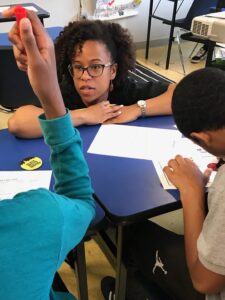Research Focus Areas:

- LGBTQ Issues in Education
- Sexuality Education
- K-12 Pedagogies
- Black Queer Epistemologies
- Gender-based Violence
- Teacher Education
- Black Cultural Archives, Memorialization, and Memory
- Multimodal Research Methods
Future Aspirations:
Most of my research experience has been in qualitative methods whether case studies, focus groups, or ethnographic research. Although, I am supportive of mixed methodology and have taken quantitative and mixed method courses in graduate school. For example, I think my research interests in gender-based violence in schools could give me a chance to pursue mixed methodology more in the future. Additionally, I would love to merge my sexuality education research with more digital methodologies in the future whether developing professional development resources for teachers or supporting the development of sexuality education curriculum.
I have completed the data collection for my dissertation and I am currently in the writing stage. I hope to defend my dissertation in December 2023.
Dissertation Research
Supporting Sexuality Education Pedagogy: A Cross-curricular Analysis in Middle School Classrooms
Abstract: There is significantly less research on sexuality education in middle schools in the United States compared to high schools. Yet, middle schools deserve more attention in social science research due to the developmental needs of students and teacher competency concerns, especially among the recent national discourse on sexuality education. Sexuality education research in middle schools can help inform professional and curriculum development that supports educators feeling more competent and students feeling engaged, knowledgeable, and more secure in the safety of U.S. schools. As such, my dissertation research seeks to do a qualitative investigation into how sexuality education is showing up in three urban middle schools from grades sixth through eighth. Through a multi-site case study following nine teachers, this dissertation research will investigate sexuality education, explicitly or implicitly, in cross-curricular ways from health, humanities to STEM classes. This research seeks to 1) understand sexuality education in middle schools in a more contextualized way, including what ways educators may encounter sexuality topics and how educators across subjects negotiate instances related to sexuality (e.g., lesson planning, class discussion, and classroom environment) and 2) identify ways to better support pedagogical and classroom approaches. My dissertation research seeks to provide implications on teacher perceptions, cross-curricular teacher competency, classroom safety, student engagement, sexualization, and adolescent health and well-being.
Qualitative Research
Street-Level Bureaucrats and Intersectional Policy Logic: a Case Study of LGBTQ Policy and Implementation Barriers
Authors: Amy Castro Baker, Amy Hillier & Monique Perry
Abstract: Without clear federal mandates protecting the rights of transgender and gender nonconforming people, local governments are drafting their own legislation that either protects or limits these populations’ rights. This leaves street-level bureaucrats situated in between competing auspices, conflicting mandates, and a constrained sense of self-determination when they are tasked with applying emerging legislation in a policy gray area. This paper considers the policy logic of an intersectional approach to LGBTQ policy, as well as the implementation barriers street-level bureaucrats may face when operationalizing LGBTQ policy in a politically complex environment. First, we use a piece of local legislation designed by transgender and LGB youth as an implementation case study focused on policy logic and policy triggers. Second, we employ thematic analysis for analyzing open-ended responses to 281 surveys completed by teachers and other school staff after training around implementation of a new district-wide policy anchored in an intersectional approach. Beyond normative, protracted implementation timelines, even when front-line workers were in full support of LGBTQ rights, tension still surfaces around the internalization of bureaucracy, fear of disciplinary sanctions, a perception of competing rights, and ambivalence with mediating between personal, familial, and youth agency. Even when using equity-focused policy approaches, stakeholders can expect to encounter implementation barriers with street-level bureaucrats (SLBs) while trying to influence higher orders of government through local advocacy and action. Altering the discourse on gender identity remains difficult in the current political environment surrounding LGBTQ rights.
Black Queer Epistemologies and Rebellious Possibilities in Teacher Education [Works-in-Progress]
Author: Monique Perry
Abstract: By generating knowledge that disrupts hegemonic narratives of truth, Black queer epistemologies (Allen, 2022; Gilbert, 2022; Snorton, 2017) can critically inform the professional and personal development of preservice educators. This paper explores how Black queer epistemologies can reshape common conceptions of sexuality in teacher education programs. Through an intersectional analysis (Collins, 2015) of the narratives of four Black queer sexuality educators, this paper details how Black queer epistemologies may emphasize rebellious possibilities that include centering collective care, erotic pleasure, sexiness development (Gilbert, 2022), and sexual intimacies. While emanating from the embodied knowledge and professional expertise of Black queer sexuality educators, these four pedagogical possibilities demonstrate the capacity of Black queer epistemologies to help preservice teachers of various identities—not just those who identify as Black and queer—to understand their own sexualities and to address sexuality education across K-12 curriculum.
Multimodal Research
Project Director: Krystal Strong, Project Archivist: Jennifer Garcon, Project Manager: Monique Perry
Mapping Disparity in Philadelphia by Jennifer Garcon
On July 23, 2019, TRL hosted a Map Room event for Prof. Krystal Strong’s Re/Member Black Philadelphia Project, which brought undergraduates and graduate students from Penn and students from the School District of Philadelphia into conversation about maps, resource disparity, and Philadelphia. The mapping workshop was taught by myself and Girmaye Misgna, the Mapping, and Geospatial Data Librarian.
The Re/Member Black Philadelphia is a multi-modal digital scholarship and community archiving project geared toward recovering and documenting the lived experiences and diverse histories of the city’s Black and African diasporic residents. Over the course of this summer and fall, in collaboration with RBP, student media makers from high schools across Philadelphia will be created micro-documentaries that investigate and interrogate changes in their own respective neighborhoods.